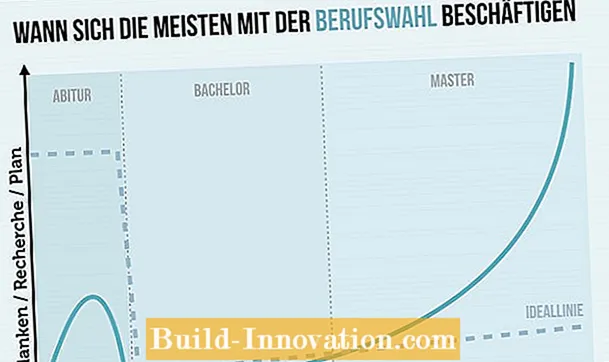Career choice: tests and help

Content
- Definition: what does career choice mean?
- Afraid of making a wrong decision
- Fear of an uncertain future
- Career choice through intensive self-reflection
- Career choice through targeted research
- Search job postings
- Job profiles: entry, career & free templates
- Ask job holder
- Recapitulate career aspirations
- Consider alternatives
- Help through advice and practice
- Job Information Center (BIZ)
- Student counseling
- Open-door day
- internship
- Does your career choice suit you?
Many students find it difficult to choose a career. On the one hand, there are endless opportunities open to you professionally. On the other hand, they do not see the forest for the trees: An oversupply of information on the one hand and a (personal) lack of information on the other make the decision difficult. The choice of profession is put off the back burner, delayed by studying. It doesn't have to be. We give you help in the form of career choice tests. We'll also show you where you can get the information you need and provide numerous tips to help you advance your career choice ...
Definition: what does career choice mean?
Career choice means that you are free to choose what career you choose. The Basic Law guarantees the freedom of occupation. This does not mean that there are no conditions whatsoever - in order to exercise a certain profession, you have to meet the corresponding requirements. But there is, for example, no state intervention like there was in the GDR, where the choice of career was linked to the social origin or the parents' loyalty to the line. Such requirements no longer hinder the career choice, but it is still difficult. There are two main reasons for this:
Afraid of making a wrong decision
Career choice is one of the first big decisions a student must make. The fear of making the wrong career choice is heightened by external pressure. Again and again you hear how well the decision should be thought out or how long-term the consequences are. To this it should be said: No career choice has to be final, there is always a way back, for example through retraining or a new apprenticeship.
Fear of an uncertain future
When choosing a career, many new question marks arise. Changes and fears about the future that many would rather not face. Those who have not yet made a decision do not have to face any consequences. So the choice of profession is postponed out of fear.

Career choice through intensive self-reflection
Everything revolves around the questions: What do I want? Which job fits me? The most difficult and at the same time most important part in choosing a career is intensive self-reflection. Unfortunately, nobody can do this work for you. But it can be made easier. A career choice test, for example, can help you choose a career. This is a test that takes into account individual factors of personality as well as knowledge and skills. We offer such a test here:
WHICH JOB FITS ME?
Career choice through targeted research
Whether at school or university, most people already have a vague idea of what they expect from their professional life. But how can a relatively abstract and imprecise wish be transformed into a job description? The answer: by specifying it and finding out which profession suits your needs. We have listed a few tips that can help you with this.
Search job postings
Enter terms that describe your topic on online job boards and job search engines. In which job descriptions do you find these terms? What is the right job title? And what requirements does the applicant have to meet? This is a very practical approach. You will find out which tasks you will have to fulfill in your future job and what requirements you can score as an applicant for such a position. If the requirements say, for example, “Completed degree in subject X”, then you have already found the right course and now you know that you want to study chemistry, business administration or politics, for example. You can also get an initial overview of numerous job profiles, requirements for the job, salary and career opportunities from us:
Job profiles: entry, career & free templates
In our overview of the most important job descriptions and job profiles you will find everything about training, studies, career and salary prospects as well as job-specific tips and free application templates. Examples:
| ➠ nurse ➠ social educators ➠ order picker ➠ engineers ➠ actor | ➠ Naturopaths ➠ train driver ➠ Architects ➠ carpenter ➠ Computer scientist |
To the job profiles
Ask job holder
The best information always comes first-hand. You should therefore ask people who are employed in the relevant industry about their job. Many schools, employment agencies and other institutions offer career orientation days or application fairs where the right people are available to answer your questions. Otherwise you do research in your environment, maybe an uncle's colleague knows someone like that. The right contact person can also be identified via social networks such as Xing or LinkedIn. Don't be afraid to ask these people for information about your dream job. Often it will also be their dream job, then you will have something in common and the conversation will be a lot of fun for both sides.
Recapitulate career aspirations
What was your first real career dream? So I don't mean “princess” or “superhero”. There is often a lot of truth in the first professional wish. Children respond according to their passions and interests. These can change over time, but you may be one step closer to choosing a career if you remember what you wanted to be in the past.
Consider alternatives
The so-called latent imprinting is to blame for the fact that alternatives are often ignored. Many only find out about professions, courses of study and companies that they already know. Anything beyond that is not even included in the decision. This is reflected in the gender choice of occupation. There are still typical male and female jobs. Schoolchildren are particularly drawn to technical, commercial or craft areas. School girls want medical, social or artistic careers. Break this bias and widen the search radius for your career choice.
Help through advice and practice
In school, the choice of career is usually dealt with, but many students feel that they are not adequately informed. In other words: take the search for information on choosing a career into your own hands. Help with choosing a career is available from various advice centers. If the fog clears afterwards, you can support your decision-making with practical insights:
Job Information Center (BIZ)
The job information center (BIZ) of the Federal Employment Agency is a good first point of contact. Here you can do specific research on various professions and get advice. Careers counseling is particularly useful if you have no idea at all and are looking for a general direction first. In the BIZ you can collect options and concretise the idea of your career choice.
Student counseling
If you know that you want to study in any case, but don't know exactly which subject is in question, you should go to a student advisory service. The central student advisory service of the respective university as well as the student unions help with the study orientation.
Open-door day
Information days in companies, better known as open days, are popular with schoolchildren. Here you will find insights and information on apprenticeships, career opportunities and important skills. In short: the full information program that is required for career choice and preparation.
internship
If you have already considered different professions, the classic internship is probably the best opportunity to gather more information. You will find out firsthand what everyday work looks like, what tasks are associated with it and what can be expected of you in professional life. At the same time, you have the opportunity to benefit from the experience of working people and to ask unanswered questions.
Does your career choice suit you?
Career choice is a process that can be accomplished using the steps above. With all this, you should keep in mind: There is no absolute certainty that you will be happy with your career choice for the next few decades. Employers, the industry or you can change. Even adults with professional experience can take a career choice test as part of their professional reorientation. The answers to the following questions provide indications as to whether a career choice really suits you:
➠ Does the job suit your interests?
➠ Are you very motivated?
➠ Can you imagine doing this for the next ten years?
➠ Do you have enough information?
➠ Have you already had experience in this area? Checklist for choosing an employer (free download)
In addition to the job, the choice of employer is of course an important factor. To make this easier for you, we have created a checklist (PDF) with which you can determine what is important to you in your dream employer. You can then enter in the table to what extent a potential employer meets your expectations ... This way you kill two birds with one stone.

You can download it for free here:
EMPLOYER SELECTION CHECKLIST



